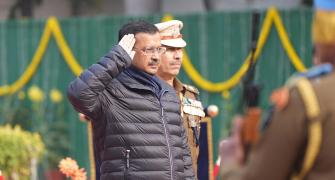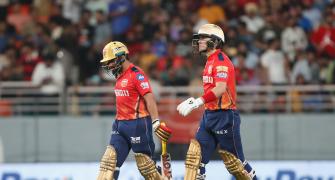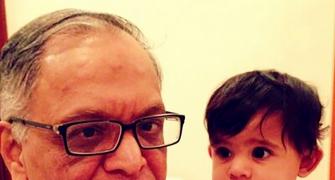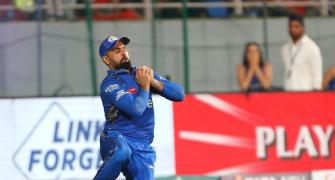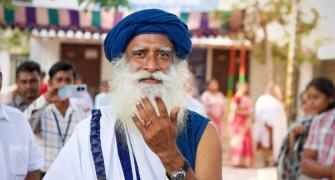Shrilal Shukla, author of the iconic Raag Darbari and winner of the Sahitya Akademi Award, passed away last week. In a touching tribute, Sidharth Monga revisits Shukla's most famous work, in which he created a "world inhabited by Jaane Bhi Do Yaaron on crack, minus the momentary optimism"
Two of my favourite places in India are fictional. I think of Malgudi and I can smell filter coffee; I think of cricket after school, of sleepy Sunday afternoons, of a breezy front veranda with cement floor that stays cool underfoot. Malgudi is a state of mind. The other place, Shivpalganj, somewhere in Uttar Pradesh, is proper Wild West. It is not a place you could describe as RK Narayan mysteriously did his fictional town: "Malgudi is where we all belong, and where we wished we lived."
Shivplaganj even the protagonist of the novel leaves in six months. It is a land of hopelessness; of feudalism, corruption and politics; of disease, desperation and deceit. It is the world inhabited by Jaane Bhi Do Yaaro on crack, minus the momentary optimism. It is a village I often find myself revisiting. It is a world created by Raag Darbari, whose author, Shrilal Shukla, died last week.
Unlike Steve Jobs, Shukla's death wasn't mourned on gmail status messages. After all Shukla didn't make you fall in love over and over again, as a person I know described Jobs's genius in his first tweet in eight months. Raag Darbari was brutal in its honesty. It shocked India. It left India naked. In the preface of the book's 40th-anniversary edition, Shukla remembers one of the first reviews back in 1967 said "to end up unread is its fate".
Two years later, though, Shukla won the Sahitya Akademi Puraskar for the novel. Raag Darbari has since gone on to become one of the most read commentaries on post-independence India. It has been adapted as a tele series, starring a young Om Puri. In the preface Shukla writes that in interviews he has often about the relevance of Raag Darbari, if in the light of middle- and upper-class corruption he wasted his energy in caricaturing a few villagers. Shukla writes his reply has always been that his depiction of the village politics might pale in comparison with corruption now, but that is what makes the book even more relevant.
Yet that bigger picture was not what drew me to the book, at least not the first couple of times I read it. It was the characters, the way they told their stories, the language. Yes, the language. This is not the Hindi you and I read in school, this is not the Hindi that was chuckled at in Chupke Chupke. Yet this is not bad Hindi, this is just liberated Hindi. It is like you are having a long conversation with Shukla.
There is an idiom in almost every paragraph, the kind you don't read in normal Hindi literature. Tan par nahi patta, paan khaye albatta (Not even a leaf to cover the body, but a betel in the mouth) ; Saala aag khayega to angar hagega (If you eat fire, you'll shit embers), Jis kisi ki dum uthakar dekho mada hi nazar aata hai (Lift whosever tail, all turn out to be females), Yeh jaangh kholo toh laaj, aur who kholo toh laaj, Deh mein aisi josh ki hawa mein danda maarte aur patta bhi khadak jaye to chhitak kar ma ki gaali de detay thay. (Such enthusiasm I had that when I wielded my stick I would abuse even the leaves that fluttered)
All this is taken from one random page. And it's so seamlessly embedded in dialogue it never seems gratuitous like the use of swearing in some Hindi films today. This is badass Hindi from badass UP, without the behendchods and madarchods.
Every page of the book has humour. Dark at times, caricature at others; dry in places, slapstick in others and sometimes both at the same time. The book is not short on Shukla's rants, but these are charming rants without moral posturing. Rants against the education system, rants against the pretentious Hindi literature of that time, rants against planning commissions and committees, rants against the idea of idyllic rural atmosphere, rants against the reverence for the English language among the policymakers, rants against the darshnik log (philosophers). There seemed in Shukla this rage that was easy to relate to, and that he laughed it off made for respect.
The language and humour stood out everywhere, both in dialogue and in narration.
A truck driver tells an educated-looking hitchhiker who refuses to bribe a daroga (police officer) on his behalf tumhari yehi taleem hai? (What have you studied?) And the narration follows, Vartaman shiksha paddati rastay mein padi hui kutiya hai jisay koi bhi laat maar sakta hai. Driver bhi us par chalte-chalte ek jumla maar gaya. (Present education system is the bitch on the road, who can be kicked by anybody. The driver too had a go at it)
The book had me at the description of the said truck on page 1. Use dekhtay hi yakeen ho jaata tha ki iska janam kewal sadakon ke saath balatkar karne ke liya hua hai. (One look was enough to know it was born to rape the roads)
There is a lovely passage on the modern tendency of giving lectures, and Shukla doesn't use the word bhashan here. Lecture Ganjahon [people from Shivpalganj] ke liye vishesh roop se dilchasp thay kyunki in mein shuru se hi vakta shrota ko, aur shrota vakta ko bewakoof maankar chalta tha joki baatcheet ke uddeshya se ganjahon ke liye aadarsh paristhiti hai Lecture ka maza toh tab hai jab sunanewalay bhi samjhein main bakwas kar raha hoon aur bolne wala bhi samjhay main bakwas kar raha hoon. On such delicate equilibrium do lectures stand in Shivpalganj; the moment either party tries to impress intelligence, the other party loses interest.
(The lecture was especially interesting for the Ganjahas because right from the start the listeners assumed the speaker was a fool, and the speaker assumed the listeners were fools. For the purpose of conversation, this was the ideal situation. A lecture can only truly be enjoyed when the speaker and the listeners both know that only nonsense is being spoken.)
Then there is a description of gaudy advertisements on the walls. Of how in these adverts the revolutionary addition of piles to the usual impotency and daad was a sign of progress, a matter of pride for the Ganjahas. This, though, was private-sector advertising. The public sector, in its malaria adverts, asked for villagers' help in eradication of mosquitoes. As if the villagers wanted to pet them. As if a change of heart was needed. Hriday-parivartan ke liye raub ki zaroorat hai, aur raub ke liye angrezi ki -- isi Baharatiya tark-paddati ke hisab se machhar maarnay aur malaria-unmoolan ki sabhi appealein angrezi mein hi likhi gayin thi (For a change of heart you need authority, for authority you need English going by this Indian philosophy all appeals to kill mosquitoes and eradicate malaria were written in English).
There is sarfari boli, a dialect that seems fictional, and includes the insertion of the sound arf after the first sound of every word. Karfaun harfai ssarfala? for example. The bhang is ubiquitous. To grind bhang is 'an art, a poem, an antic, a ritual'. And immediately, to cut back to realism, to kill the romance of the bhang, he writes, Waisay takke ki patti ko chabakar pani pee liya jaye to achha-khaasa nasha aa jayega, par yeh nashebaazi sasti hai. (Although you could get high with a leaf bought for a taka, that's a cheap high.)
Then there are the three instructive tricks to win an election: the Ramnagar trick, the Nevada trick, the Mahipalpur trick. Ramnagar trick becomes useful when two main candidates are from the same caste and command similar respect, in the Nevada trick the Brahmin candidate uses the services of a babaji, his ganja and bhang to get the better of the rising Shudra.
The Mahipalpur trick started as an accident, but just like Newton found the truth of gravity in an accident, this scientific method was used extensively. The election commissioner could -- on the insistence of one of the candidates -- have his watch run fast by an hour, and the said candidate could make sure all his votes had been cast by an hour before the scheduled close, giving him a head start. In Raag Darbari, Vaidya ji, a kind of feudal lord, uses the Mahipalpur trick to beat the Nevada trick, the modern scientific philosophy to fight the winds of change.
That this kind of irony lived happily with the other humorous gems on almost every page made it more than just a collage of humorous episodes. This book is not a comedy, though, much in the way that Oye Lucky Lucky Oye wasn't one. I am sure college courses in Hindi study Raag Darbari and Shivpalganj much more extensively. That there are non-amateurs out there who understand the book much better than I do.
Shukla himself found enthusiasm in the increasing use of the book in academic institutions. That he said four years before he died. When he died, though, it didn't feel like that. The nation had just finished mourning Jobs's death and was getting ready to dive into the Grand Prix celebrations. At least English newspapers didn't have enough space for a proper obituary. There were a few quotes in the inside pages. The best one was that he "took the art of caricature to the level of painting".
It is just as well, though. Reading whatever was on offer I learned he was a reticent man. The book tells me he would make fun of elaborate eulogies anyway if he were alive. Keeping in with the spirit of Raag Darbari, Shukla ji tein bol gaye should suffice as tribute.
Sidharth Monga is an assistant editor at Cricinfo

